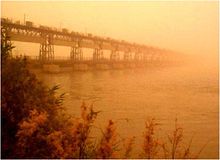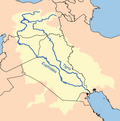Samarra Barrage
| Samarra Dam | |
|---|---|
 | |
| Location | Directly east of Samarra, Salah ad Din Governorate, Iraq |
| Coordinates | 34°11′45″N 43°51′02″E / 34.19583°N 43.85056°E |
| Opening date | 1956 |
| Operator(s) | Ministry of Water Resources |
| Dam and spillways | |
| Impounds | Tigris River |
| Elevation at crest | Approx. 65 m (213 ft) |
| Spillway capacity | Samarra Barrage: 7,000 m3/s (247,203 cu ft/s) Tharthar Regulator: 9,000 m3/s (317,832 cu ft/s) |
| Reservoir | |
| Total capacity | 150,000,000 m3 (121,607 acre⋅ft) |
| Power Station | |
| Commission date | 1972 |
| Type | Run-of-the-river |
| Turbines | 3 x 28 MW Kaplan-type |
| Installed capacity | 84 MW |
The Samarra Barrage (Arabic: سد سامَرّاء) is a multi-purpose barrage on the Tigris River adjacent (west) of Samarra and north of Baghdad, Iraq. The main purpose of the dam is to divert floodwater in the Tigris River to Lake Tharthar through the Tharthar depression along with irrigation and an 84 MW hydro-electricity station. It also serves to produce hydroelectric power and flood control – although the later has become less critical with the construction of the Mosul Dam upstream and several other large dams in Turkey.
It was completed in 1956 by the German company Züblin. Designs were completed by the British firm Voganlei and Coode. The power station was commissioned in 1972. The Samarra Barrage portion of the structure has 17 gates capable of passing 7,000 m3/s (247,203 cu ft/s) of water to the Tigris while the Tharthar regulator can divert up to 9,000 m3/s (317,832 cu ft/s) into a canal with 36 gates. The reservoir's design capacity is 150,000,000 m3 (121,607 acre⋅ft) but much of that is filled with sediment.[1][2]
The intent was to use water stored from the Samarra Barrage and the Ramadi Barrage for irrigation. However, evaporation on Lakes Habbaniyah and Tharthar lead to reduces storage and high salinity; conditions unsuitable for irrigation.[3]
References
[edit]- ^ "Iraqi Dam Assessments" (PDF). Iraq: United States Army, Corps of Engineers. 6 June 2003. Archived from the original (PDF) on 24 September 2015. Retrieved 27 February 2012.
- ^ "Electrical Power Stations in Iraq" (PDF). Arab Union of Electricity. Retrieved 27 February 2012.[permanent dead link]
- ^ "Managing Water For Peace: The Tigris and Euphrates Rivers". United Nations University. Retrieved 27 February 2012.


